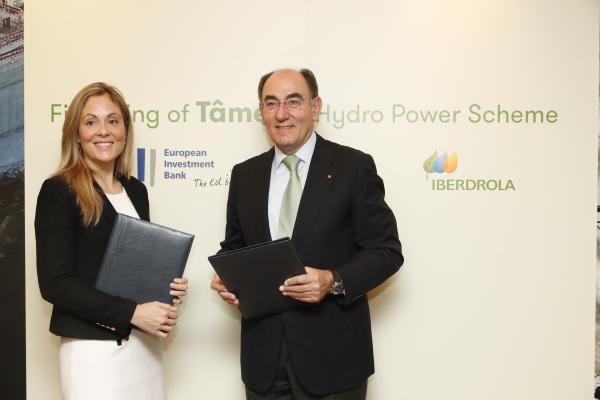
- The EIB will provide EUR 650m for a project entailing total investment of around EUR 1.5bn
- The dams will support the growth of electricity generation from renewables and increase the security of electricity supply on the Iberian market
- The project will require employing up to 13,500 people during the entire construction phase and several hundred in operational phase
The European Investment Bank (EIB) is financing one of the most important energy sector initiatives in Portuguese history. The EU bank will provide a EUR 650m loan to Iberdrola to support a major hydro electrical project that will increase energy storage capacity in the EU, provide services to the Iberian grid operators and ultimately facilitate the increase of the renewable share of the Portuguese energy mix. This investment will reduce the dependence of the Iberian market on fossil energy as well as CO2 emissions. Through this agreement with Iberdrola, the EIB is contributing to the construction of three new large dams and hydropower plants, including a pump storage plant, which will be located on the Tâmega and the Torno rivers, in northern Portugal. With an investment of around EUR 1.5bn, the new Iberdrola´s new infrastructure will have a total capacity of 1,158 MW and will start operating in 2023. To advance the project’s implementation, the EIB and Iberdrola today signed a EUR 500m loan, the first tranche of the total EUR 650m in funds approved to finance this project.
The Portuguese and Spanish electricity markets will benefit from the new infrastructure. By increasing generation and storage capacity, the new plants will provide more flexibility and security of energy supply on the Iberian electricity market.
The dams (Alto Tâmega, Daivões and Gouvães) are located in the Douro River Basin and are expected to provide an average of 1,760 GWh per year to the Iberian market. Located in a European cohesion region, Iberdrola´s project will also foster economic activity and employment. It will create direct and indirect jobs and will contribute to the economic, social and territorial cohesion of the EU. The project will require hiring up to 13,500 people, including direct and indirect jobs, during the entire construction phase and several hundred in operational phase.
The project is part of the Portuguese National Programme for Dams with High Hydroelectric Potential (PNBEPH). The promoter, Iberdrola, won the concession of the project to design, build and operate the plants following a competitive tendering process.
At the event held today in Madrid, attended by EIB Vice-President, Emma Navarro, and the Chairman and CEO of Iberdrola, Ignacio Galán, Navarro emphasised “the positive impact of this project to foster the development of clean energy and its contribution to economic growth and job creation in Portugal. This agreement represents a new step towards the implementation of the EU energy policy and climate action objectives. This EIB financing will support the increase of renewable generation in the Portuguese energy mix and will contribute to a sustainable and secure supply of energy. The EIB, which stands ready to step in to finance sound projects that meet our criteria and respond to EU energy policies, is particularly committed to financing green energy projects across the Union”.
Ignacio Galán pointed out that “this financing agreement is another step in our collaboration with the EIB and marks a new milestone in one of the largest energy projects in the history of Portugal. The development of the Tâmega hydro power scheme involves three of Iberdrola's core strategic undertakings: investing in clean generation capacity, the development of new storage capacity – with pumped hydro being the only technology to store large amounts of energy efficiently – , and sustainable financing. 23% of our financing is already green which highlights our commitment to sustainable development.”
As the largest multilateral provider of climate finance worldwide and largest issuer of green bonds, the EIB is committing at least 25% of its investments to climate change mitigation and adaptation, supporting low-carbon and climate-resilient growth. In 2017, the EU bank exceeded its climate action target for the eighth year, providing EUR 19.4bn to fight climate change.

©EIB
Download original